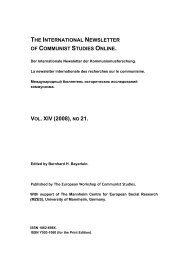11RXNdQ
11RXNdQ
11RXNdQ
You also want an ePaper? Increase the reach of your titles
YUMPU automatically turns print PDFs into web optimized ePapers that Google loves.
‘In spite of Sartre’s goal to defend Jewish “plight”’, Kritzman remarks, ‘his focusing<br />
on Jewish characteristics, and on Jewishness as a socially constructed way of being, led<br />
him to formulate a negatively conceived essentialism on what he termed the “Jewish<br />
question”’.’ 20 Kritzman intimates that the Sartrean model, which is predicated upon a<br />
dialectical relation between the anti-Semite and Jew, between self and Other, between<br />
sameness and difference, constructs Jewishness as ‘the result of the gaze of the anti-<br />
Semite’. 21 The Sartrean situation, according to Kritzman, ‘produces a sense of difference<br />
derived from the petrifying order of the same’. 22 He levels the charge against Sartre of<br />
constructing ‘the “Jew” [as] both the sight (the vision) and the site (the locus) of the anti-<br />
Semite’s existence. Within this framework, the “Jew”’ becomes the repository of<br />
absolute hatred.’ Kritzman conflates the gaze of the anti-Semite with Sartre’s analyses of<br />
the discourse of anti-Semitism which scapegoats and excludes the Jew. Kritzman is<br />
wrong to suggest that Sartre (or at least his model of analysis) ‘overdetermines Jewish<br />
subjectivity and makes it the effect of the anti-Semite’s visual prowess’. 23 Kritzman<br />
attributes to Sartre the object of his critique: anti-Semitism. Two problems marred the<br />
intervention of Sartre’s Anti-Semite and Jew: Sartre is accused of voiding Jewishness as a<br />
category of its historical and religious content; his Zionism is a thorny issue.<br />
In Black Orpheus, Sartre enlarges upon the key crucial ideas in his Anti-Semite and<br />
Jew: that the gaze of the white creates the Negro, and that these two protagonists are<br />
involved in a situation which perpetrates the racism of the former vis-à-vis the latter.<br />
According to Sartre, belonging to a given society is bound up with what he calls ‘the<br />
untranslatable elocution of its language’ which hypostatizes its specific traits. 24 Because<br />
of the diasporic character, the disciples of Négritude have to write their ‘gospel in<br />
French’. 25 French was the only medium available to them through which they could<br />
communicate. By adopting the French language, these writers found themselves in the<br />
paradoxical situation of espousing the very culture that they were bent on rejecting. 26 As<br />
Sartre points out, they speak in order to destroy the language in which the oppressor is<br />
present: their main project is to ‘de-gallicize’ its signifiers. 27 He describes the poetry of<br />
Négritude as a sort of ‘auto-holocaust’: the ‘conflagration’ of the language. Arguably,<br />
Sartre anticipates deconstruction. He argues that the moment they overthrow a language<br />
consecrating the priority of white over black, not only do they overturn the hierarchical<br />
coupling of this binary and all the conceptual oppositions which perpetrate the rhetoric of<br />
difference, but they poeticize this language. 28 Sartre warns that this poetry is racial,<br />
written not for the white, replicating in its struggle the impetus of white racism. Unlike<br />
the other oppressed minorities in white societies, whether these represent a class interest<br />
or an ethic group, the black cannot deny that he or she is black. That is to say, the black<br />
cannot lose him/herself in an ‘abstract uncolored humanity’. 29 They are no ‘avenues of<br />
escape’ for the Negro who is ‘held to authenticity’. 30 Because the white has thus far<br />
deprecated the blackness of the Negro, Négritude is the only avenue open to the Negro<br />
for freedom. Négritude is the Negro’s consciousness of race and the Negro’s coming to<br />
terms with his/her situation as black. Sartre perceives the mythopoetics of Négritude as a<br />
necessary step in a dialectical movement which will bring white and black together in a<br />
classless society. In his terms,<br />
Negritude appears as the weak stage of a dialectical progression: the theoretical




